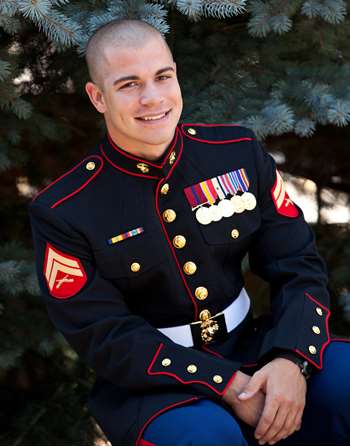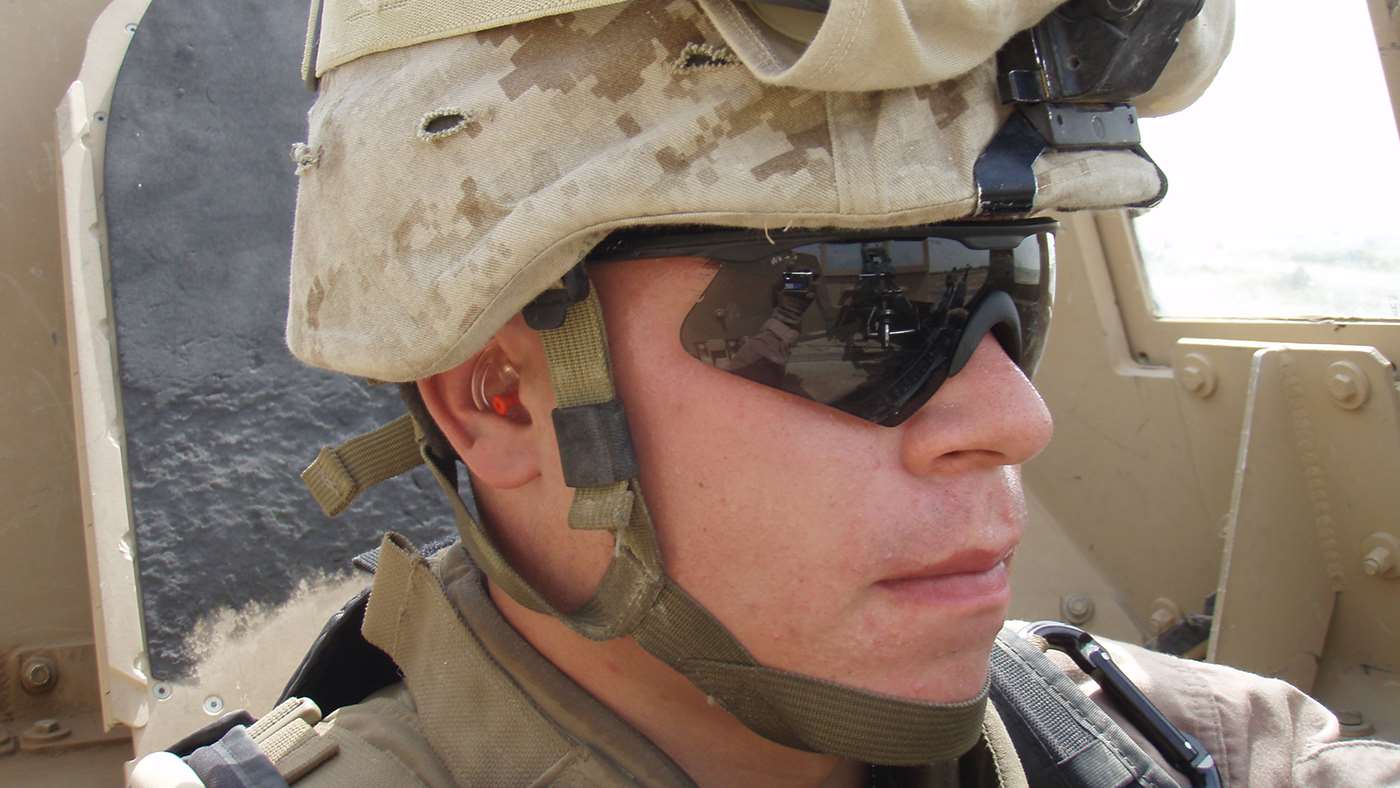From Marine to Medicine: A Man's Life of Service
 While serving his country was a clear part of Matthew Ewy’s future from a young age, serving his community as a health-care provider wasn’t in the picture until he was already overseas. Still, he sees both as “missions” and is now applying the same discipline and leadership skills he acquired in the Marine Corps as a second-year medical student at the Medical College of Wisconsin.
While serving his country was a clear part of Matthew Ewy’s future from a young age, serving his community as a health-care provider wasn’t in the picture until he was already overseas. Still, he sees both as “missions” and is now applying the same discipline and leadership skills he acquired in the Marine Corps as a second-year medical student at the Medical College of Wisconsin.
Like so many young men and women today with strong military families, the events of September 11, 2001, left a lasting impression on Ewy, who grew up in St. Paul Park, Minnesota.
“I do recall the morning of 9/11,” he reflects. “I was in eighth grade, and my father had injured his shoulder and was home recovering. We turned on the news and saw the second plane hit the towers. I knew the gravity of the situation right away. Just two years later, I was looking into the military.”
Ewy enlisted in the Marines in 2006, right out of high school. After his boot camp graduation, he completed infantry school and was assigned to First Battalion, First Marine Regiment, First Marine Division at Camp Pendleton, California. During his period of service, Ewy was deployed in support of Operation Iraqi Freedom in 2007 and later conducted counter-piracy operations with the 13th Marine Expeditionary Unit off the eastern coast of Africa in 2009.
Ewy says the experiences he had in the Marines have shaped his personality and character, even the most challenging ones. “I saw many events during my military career that I wish had different outcomes,” he says. “I’ve lost friends, lots of friends, who were role models to me. In fact, this year marks the 10-year anniversary since my unit was attacked in Iraq.”
He shares the story of that life-changing event: “Early that August night, I was feeling content with life, having just received a care package and communication from home. It all ended abruptly on the roof of my compound later that night where I watched a squad from my platoon leave l to extract scout snipers. I saw a gigantic bright flash of light followed by a huge noise. One of our Humvees, which I had just seen driving away from the compound, drove over a farmland canal bridge where a bomb had been planted. The driver was killed, and three others were severely injured. It was a long 12-hour night of relaying information and coordinating evacuation helicopters. It definitely changed my outlook on life – the sacrifices you make.”
Ewy’s time of active duty also led him toward an interest in medicine. He learned lifesaving trauma skills from Navy corpsman medics, who provide health care to Navy and Marine Corps members. If a corpsman get injured, Ewy says, his Marines needed to know what to do. “We had to step up. It got me interested in human anatomy and physiology.”
But his first foray into health care wasn’t a pre-med pathway. Instead, after four years of active duty, with accolades including honor graduate at both the School of Infantry and Corporal’s Course, two meritorious promotions, the combat action ribbon and the good conduct medal, Ewy headed to the University of Wisconsin-Madison to earn a bachelor’s degree in dietetics.
It was during his post-graduate time working as a registered dietician and in clinical research that Ewy realized he wanted more involvement in patient care. “I worked with a physician who was conducting research in the field of gastroenterology, and I helped recruit patients for clinical trials,” he explains. “It was nice to see that aspect of medicine and solidified that I wanted pursue medicine as a career.”
Ewy wanted to stay in Wisconsin for medical school to make the transition easier on his family, and MCW provided the opportunities he was looking for in his education. “MCW appealed to me because I liked the overall curriculum design,” he says. “I was interested in dedicated project time — the Scholarly Pathways Program — and early clinical exposure.”

Today, Ewy serves as the student co-president of the American College of Physicians-American Society of Internal Medicine. And last summer, he worked as a mentor in the MCW Apprenticeship in Medicine program that provides carefully selected high school students from diverse backgrounds the opportunity to stimulate their interest in careers in medicine, biomedical research and allied health.
Ewy continues to use what he learned in the Marines to shape his new experiences as a future physician. “It’s the discipline and maturity factor that the Marine Corps taught me that helps me focus in medical school,” Ewy says.
And he doesn’t see the military influence stopping once he graduates.
“I look at patients as my ‘mission,’ and in doing so I feel as if I will be able to provide a more patient-centered approach to their care,” he says. “In addition, in military and medicine, you have to rely on teamwork. You must be open to input from all members of the team. The Marine Corps was a very team-based environment, as was being a dietician. So teamwork is high on my list of priorities as a physician, and I hope my past experiences can help improve that aspect of patient care.”



